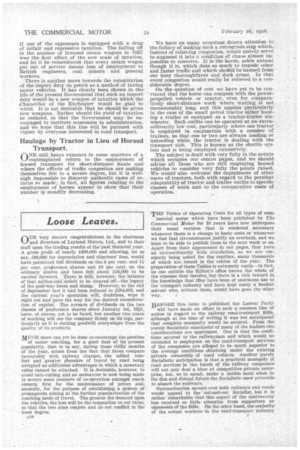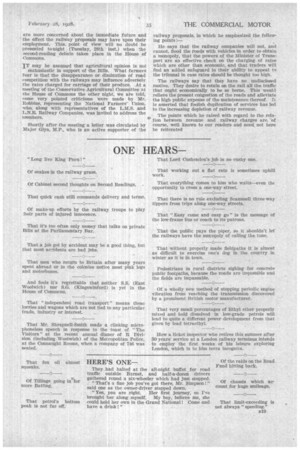Loose Leaves.
Page 44

Page 45

If you've noticed an error in this article please click here to report it so we can fix it.
OLIR very sincere congratulations to the chairman and directors of Leyland Motors, Ltd., and to their staff upon the tracing results of the past financial year. A gross profit of nearly £400,000 and allowing, let us say, 180,000 for depreciation and directors' fees, would have permitted full dividends on the 6 per cent. and 71 per cent. preference shares and 10 per cent. on the ordinary shares and have left about £54,000 to be carried forward. There is still, however, the balance of that million-odd deficit to be cleared off—the legacy of the post-War boom and slump. However, at the end of September last it had been reduced to £284,600, and the current year's operation will, doubtless, wipe it right out and pave the way for the desired reconstruction of capital. The arrears of dividends on the two classes of preference shares since January 1st, 1921, have, of course, yet to be faced, but another two years of working will see the company firmly on its legs, particularly as it is earning goodwill everywhere from the quality of its products.
MUCH More can yet be done to encourage the pastime
of motor coaching, for a good deal of its present popularity, that is to say, during these chilly months of the year, arises from the fact that fares compare favourably with railway charges, the added comfort and greater pleasure of travel by road being accepted as additional advantages to which a monetary value cannot be attached. It is desirable, however, to avoid rate-cutting and an endeav,our is now being made to secure some measure of co-operation amongst coach owners, first for the maintenance of prices and, secondly, for the purpose of establishing a system of propaganda aiming at the further popularization of the coaching mode of travel. The greater the demand upon the vehicles, the less will be the temptation to cut rates, so that the two aims conjoin and do not conflict in the least degree.
a18 THE Tables of Operating Costs for all types of com
mercial motor which have been published by The Commercial Motor for 19 years have now undergone their usual revision that is rendered necessary whenever there is a change in basic costs or whenever we feel that circumstances justify an overhaul, and we hope to be able to publish them in the next week or so. Apart from their appearance in our pages, they have an extraordinarily wide circulation, as we are constantly being asked for the reprints, many thousands of which are issued in the course of the year. The preparation of these Tables is extremely costly—in fact, no one outside the Editor's office knows the whole of the expense they involve, but there is a rich reward in the knowledge that tffey have been of enormous use to the transport industry and have kept many a haulier solvent who, without them, would have gone the other way.
BEFORE this issue is published the Labour Party
will have made an effort to seek a common line of action in regard to the railway road-transport Bills, although at the time of writing it was not aaticipated that complete unanimity would be secured. From the purely Socialistic standpoint of many of the leaders two considerations are uppermost. One is that the conditions secured to the railwaymen and which would be extended to employees on the road-transport services of the companies are alleged to be much superior to the average conditions obtaining under the existing private ownership of road vehices. Another purely Socialistic anticipation is that a practical monopoly of road services in the hands of the railway companies will not only deal a blow at competitive private enterprise, but, so to speak, make a double meal when in the dim and distant future the Socialistic maw proceeds to absorb the railways.
Nationalization spread over both railways and roads would appeal to the out-and-out Socialist, but it is rather remarkable that this aspect of the controversy has received so little attention from supporters or opponents of the Bills. On the other hand, the majority of the actual workers in the road-transport industry are more concerned about the immediate future and the effect the railway proposals may have upon their employment. This. point of view will no doubt be presented to-night (Tuesday, 28th inst.) when the second-reading debate takes place in the House of Commons.
IT may be assumed that agricultural opinion is not• enthusiastic in support of the Bills. What farmers fear is that the disappearance or diminution of road competition with the railways may influence adversely the rates charged for carriage of their produce. At a meeting of the Conservative Agricultural Committee at the House of Commons the 'other night, we are told, some very pointed criticisms were made by Mr. Robbins, representing the National Farmers' Union, who, along with representatives of the L.M.S. and L.N.E. Railway Companies, was invited to address the members.
Shortly after the meeting a letter was circulated by Major Glyn, M.P., who is an active supporter of the railway proposals, in which he emphasized the following points :— He says that the railway companies will not, and cannot, flood the roads with vehicles in order to obtain a monopoly, that the powers of the Minister of Transport are an effective cheek on the charging of rates which are other than economic, fusd that traders will find an added safeguard in their ability to appeal to the tribunal in case rates should be thought too high.
The railways say that they have no undisclosed motive. They desire to retain on the rail all the traffic that ought economically to be so borne. This would relieve the present congestian of the roads and alleviate the high public expense of the maintenance thereof. It is asserted that foolish duplication of services has led to the increasing depletion of railway revenue.
The points which he raised with regard to the relation between revenue and railway charges are, of course, well known to our readers and need not here be reiterated




















































































































